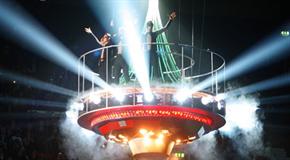Features
Take That Tackles Ticket Mafia

It will mean checking 150,000 tickets and IDs as fans queue to get into the shows at Hamburg Imtech Arena, Düsseldorf Esprit Arena and Munich Olympiastadion July 22-29.
“It makes no sense to implement such an elaborate system if you don’t enforce it,” he said in an interview with Süddeustche Zeitung.
He told the German paper that foiling scalpers by issuing personalised tickets “worked wonderfully” when Germany staged the 2006 World Cup. He’s just applying the same principle to a live music event.
In the SZ interview Sabottka launched a scathing attack on touts that are already selling Take That tickets with face values ranging from euro 55 to euro 82 for as much as euro 2,000.
He said most touts are charging between euro 150 and euro 200 and even that was too much.
Sabottka, chief of Berlin-based promoter MCT and manager of German band Kraftwerk, said that in Germany there’s no legal redress against people selling tickets for “gigantic sums.” He said he can’t understand why the practice isn’t banned throughout Europe.
He said he hopes he’ll deter people from buying from touts by making them realise that a ticket bought on the secondary market is unlikely to be accepted at the venue entrance.
“You will get a ticket that has any old random name on it. The reseller will try to convince you that it won’t be difficult to be admitted to the concert with it because people assume that no one will really check the ticket.” he explained.
“Basically, the theory goes: How can they check 75,000 names?”
He also said the live music business has been complicit in the spread of the secondary market because everyone saw a chance to cash in on it.
“The industry got into this predicament because it started doing it itself. They couldn’t get enough and wanted a piece of this money,” he explained. “In the worst case, the promoter, the band, and the ticketing system get in bed together and rip off the customer. Some of them even get paid for issuing tickets to secondary ticketing.”
He said he could say – for example – a show at the 10,500-capacity Munich Olympiahalle was sold out when it had only done 7,500 because he could let the remaining 3,000 tickets go to a reseller and cash in even more.
“As the consumer, you have no idea about this. You go to an advance ticket sale outlet, and they tell you it’s sold out. Then you go online, and the ticket costs euro 178 and you buy it. Or, someone makes you think you have to book a hotel room and a trip to get the ticket.”